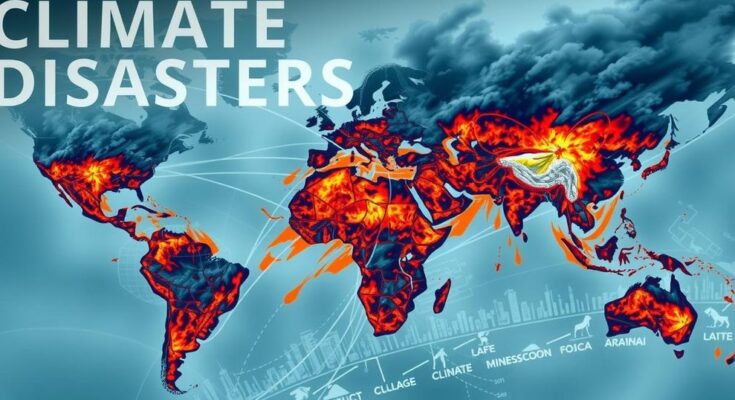In 2024, climate disasters caused $229 billion in damages and 2,000 deaths, predominantly in the U.S. Hurricanes Helene and Milton led to unprecedented losses. With typhoons and floods affecting multiple continents, the evidence of climate change’s impact continues to grow, demanding urgent action from global leaders. The cry for maintaining financial commitments to vulnerable countries was echoed in the face of human suffering and rising disaster frequency.
The year 2024 experienced significant devastation from climate disasters, resulting in $229 billion in damages and approximately 2,000 fatalities. A substantial 75 percent of these financial losses were incurred within the United States, primarily due to Hurricanes Helene and Milton, each contributing over $75 billion in damages. Extreme weather events, including typhoons and floods across Asia, Europe, and Latin America, underscored the pervasive impact of climate change on a global scale.
For the first time since monitoring began in 2018, two hurricanes generated losses exceeding $50 billion each, illustrating the escalating financial toll of climate catastrophes. The top ten climate-related disasters all recorded damages exceeding $4 billion each, while typhoons in Southeast Asia and floods in Brazil and China further illustrate the increased frequency and intensity of such events, fueled by climate change.
Beyond monetary losses, the human suffering resulting from these disasters remains profound. The deadliest incident, Typhoon Yagi, caused the loss of at least 829 lives in Southeast Asia. Other incidents, like storm Boris in Europe, resulted in both fatalities and substantial economic impacts. Concurrently, droughts in Africa and heat waves in Bangladesh exemplify the widespread damage that difficult-to-quantify events can wreak on food security and public health, affecting vulnerable communities disproportionately.
The attribution of these disasters to human activity is supported by scientific consensus. Dr. Mariam Zachariah of Imperial College London noted, \”Most of these disasters bear the clear imprint of climate change.\” Climate-related phenomena are exacerbated by the burning of fossil fuels, leading to increased frequency and severity. Christian Aid highlights that actual economic losses may be understated due to uninsured populations, particularly in developing nations.
Christian Aid’s CEO, Patrick Watt, called for immediate governmental action to mitigate sorts, emphasizing that \”Human suffering caused by climate change reflects political decisions.\” He criticized the lack of commitment to curtail emissions and provide support to the most affected countries, stressing the urgent need for adherence to financial pledges made to address climate adaptation and mitigation.
The events of 2024 serve as a clarion call for enhanced global efforts to counter climate change. While affluent nations grapple with the ramifications of extreme weather, poorer countries continue to face severe challenges. Without decisive action to diminish reliance on fossil fuels and fortify infrastructure, the escalating pattern of disasters is sure to persist. Solutions exist that necessitate both political determination and international collaboration.
Ultimately, the 2024 report cautions against ignoring the grave human and economic repercussions of climate change. It emphasizes that proactive decisions taken today will dictate future outcomes. Investing in climate resilience not only addresses current risks but also prioritizes the safeguarding of lives and economies.
The economic and human repercussions of climate disasters have become increasingly pronounced in recent years, especially with the evident link to global climate change. In 2024, significant occurrences such as hurricanes, typhoons, and floods resulted in record financial losses and fatalities. Understanding the dynamic impact of these climate disasters, particularly on vulnerable populations, exemplifies the ongoing challenges faced globally.
The calamities of 2024 underscore the urgent necessity for concerted global action against climate change. The human toll and financial costs are profound and highlight the disparities faced by developing nations. Every subsequent disaster reiterates the importance of responsible decisions today to mitigate future effects. A renewed commitment to resilience and emission reductions is essential to protect communities and economies worldwide.
Original Source: www.drivingeco.com




